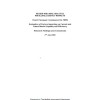Moffatt Associates devised a research format for monitoring trends in energy market prices and canvassing market views on future market developments and the implications of public policy actions at both the EU and national level.
The “Energy Viewpoints Bulletin” is distributed free of charge electronically and is now read by over 2000 market participants every quarter.
This regular, quarterly survey, sponsored by APX and produced in association with EFET, summarises expectations about future energy market prices, based on responses from a research panel of 80 market participants covering most of Europe. This panel is a representative sample of regulators, generators, suppliers, traders and analysts.
Every quarter, MA canvasses views on wholesale market developments in power, gas and CO2. In addition, we select a special topic for investigation each quarter and we invite contributions from leading market participants. The survey itself takes the form of a detailed telephone questionnaire and is conducted on a strictly confidential and non-attributable basis.
Company website:
http://www.moffatt-associates.com/

